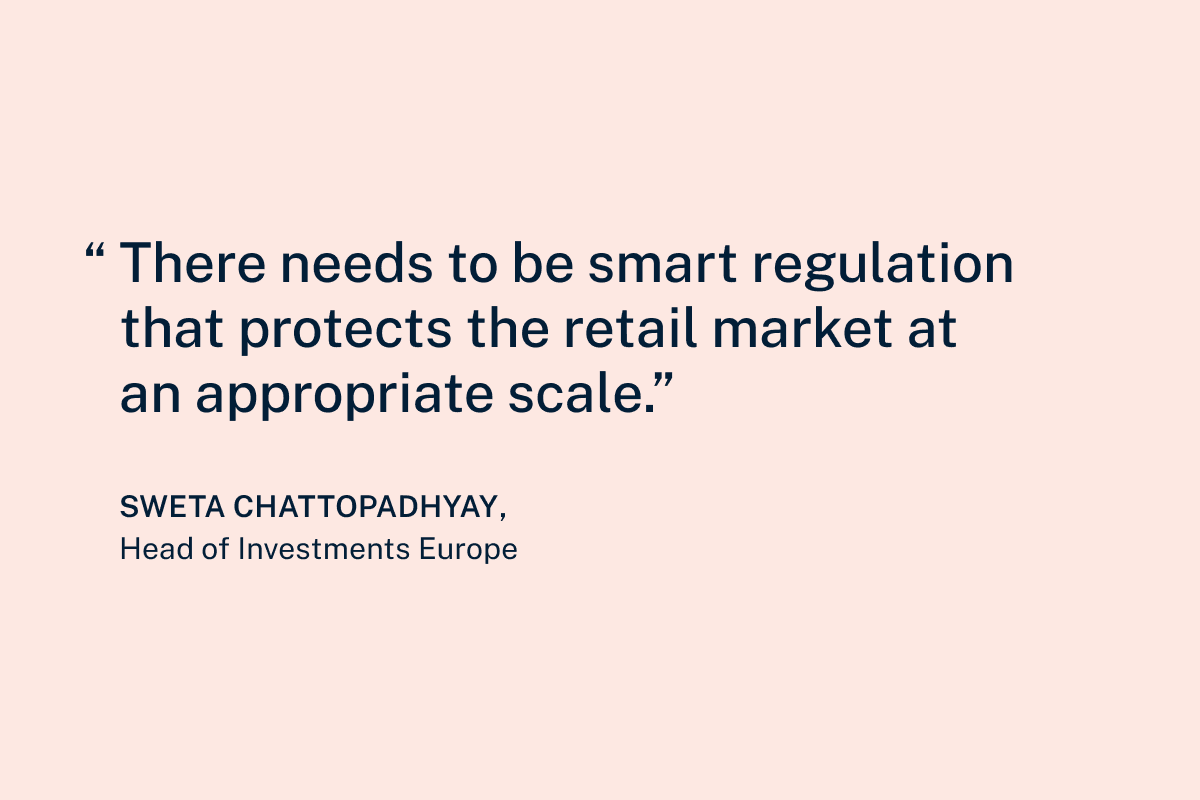
Key takeaways
- Private markets are democratizing as individual non-professional (retail) investors gain broader access to private equity opportunities – a trend that began in the US but is now expanding globally.
- This is a positive development that is enabling retail investors to access asset classes characterized by high risk-adjusted returns, and to diversify their portfolios across private and public markets.
- However, as private markets open up to non-professional investors the industry will need to become more accommodating to those with less investment expertise by providing educational and informational resources, expanding offerings with fund structures more suited to retail investors, and rethinking policies on transparency and information sharing.
- We should expect ongoing discussions as regulators work out how to engage with this trend and ensure greater protection for investors.
Current situation
Due to a number of factors, the retail investor community has become increasingly proactive when it comes to taking responsibility for maximizing the value of their investments over the past couple of years. Current interest rate environments, higher inflation and aging demographics with higher requirements for post-retirement living costs are encouraging individuals without professional investing experience to educate themselves and embrace emerging technology platforms to seek out new ways to increase their returns.
It is now easier than ever for non-professional investors to operate their own investments. Mobile trading applications have opened up stock trading to new audiences, providing real-time oversight of investments, while digital wallets have enabled investments in whole new asset classes such as cryptocurrency. Private equity investments are also gaining popularity as a means of generating higher returns, thanks to specific technology platforms such Moonfare’s which allow retail investors to allocate funds to private equity investments.
Although the definition of retail investors differs from market to market, the US definition – non-accredited investors with up to $1 million in assets or an annual salary of up to $200,000 – is broadly typical. Historically private equity investments have not been readily accessible to this group and were instead restricted to institutional investors and only the most affluent individuals and family offices, however access is now opening up to those whose wealth is more modest in comparison.
This democratization of private equity has been led out of the U.S. where the Asset Management Advisory Committee (AMAC) is lobbying the U.S. Securities and Exchange Commission (SEC) to broaden access to private equity for retail investors. This comes at a time when changes to US pension scheme (i.e. 401k) rules mean employees now have the option to include private equity investments within their retirement savings.
Interest in retail investors accessing private assets is not limited to the U.S. The UK’s Financial Conduct Authority (FCA) has released a policy statement on the creation of its Long-Term Asset Fund (LTAF) regime. This recommends supporting retail investors to invest in long-term, illiquid assets through the introduction of longer redemption periods, higher levels of disclosure, and the introduction of stronger liquidity management and governance features. A related proposal is seeking the removal of fee capping on funds that can be held within Defined Contribution (DC) pension schemes, thus enabling traditionally more expensive private funds to be held in UK pensions – acknowledging the potentially higher net returns available from such investments.
Elsewhere in Europe, the European Union proposed changes to its European long-term investment fund (ELTIFs) framework in late 2021 with the intention of broadening investment opportunities for retail investors. Amongst the proposed changes, which will be further assessed this year, is the removal of the minimum €10,000 investment threshold alongside measures to strengthen investor protection.
Implications for the private market landscape
This democratization of private markets is a trend to be welcomed, yet it is still early days as providers assess what their offerings should look like and, critically, lawmakers decide how to regulate the market effectively. As Sweta Chattopadhyay, Head of Investments, Europe for Moonfare, observes “there needs to be smart regulation that protects the retail market at an appropriate scale, whilst allowing them access to Private Markets opportunities that could be really beneficial as part of an individual’s portfolio.”
For private equity investments to truly deliver for non-professional investors, there are still a number of areas that the industry itself needs to pay attention to, and which are likely to evolve as private equity grows in popularity amongst the retail segment. These include:
1. Investor education
Education will be one of the key drivers for private equity being treated as a credible and viable retail investment opportunity. At present an average investor has limited knowledge of the characteristics of private equity and the dynamics of how private markets work. Likewise, there is currently no broad understanding of the benefits and risks. This will need to change.
The retail investor class needs to understand the different strategies within private markets, as well as how funds are structured, and the lack of liquidity that private market investing typically involves. A grasp of fees and expenses is also vital. Potential investors should be familiar with how the industry measures performance, such as Internal Rate of Return (IRR) metrics; the difference between primary and secondary investments; the characteristics of different managers; and what drives standout performance.
The industry should adapt by developing educational materials and organizing accessible events where investors can learn about private equity and how it can become part of their portfolios.
2. Product offerings
As greater numbers of non-professional investors consider entering private markets, we can expect the emergence of new and innovative products tailored to their requirements. We have already seen the emergence of new fund structures such as shorter term vehicles, open-public hybrids and opened-ended funds with more mechanisms for redemption. The challenge will be how to make these products work without diminishing returns.
3. Transparency and disclosure
Lack of data is an issue when it comes to private market investments. This is particularly important since non-professional investors need to get comfortable with the fact that they are a couple of layers removed from the invested company. In the case of investments made through a platform such as Moonfare, both the fund manager and the platform which underwrites the manager act as intermediaries.
Investors require sufficient information to make educated investment decisions. While there is unlikely to be a future scenario whereby private companies disclose as much information as public companies, there should be a trend towards greater transparency over time. Indeed we are already seeing this with last month’s announcement from the US SEC that it intends to introduce new rules to enhance the regulation of private fund advisers, including increasing transparency by requiring private fund advisers to provide investors with quarterly statements detailing certain information regarding fund fees, expenses, and performance.
4. Illiquidity and extended investment horizon
Part of the thesis of private equity is around buying into a company and improving it over a period of five to seven years, sometimes longer, before realizing investment gains. This long-term structure works for institutional investors but can pose challenges for individual investors. For instance, such a structure may be too rigid for a retiree who wants to withdraw money from a 401(k) or individual retirement account (IRA).
As Moonfare’s Chattopadhyay observes: “It’s important to understand that private equity is illiquid and we would encourage any investor, especially in the retail segment, to keep the long-term aspect in mind. It’s very unlikely that you’ll ever have fully liquid private equity, or that private equity as an industry will move towards becoming tradable security.
Secondaries are an important mechanism for retail investors to exit a position early, but even here it is important to keep in mind that if selling in a distressed position, a discount is likely. Moonfare now offers a secondary market solution where investors have the chance to sell their interests before the end of the fund’s lifecycle. Chattopadhyay points out that “ the platform is unique in the industry and gives investors a possibility to rethink their liquidity needs, and it is particularly useful for individuals to have this optionality. Nevertheless, it is still recommended that anyone investing in private markets should adopt a long-term mindset at the outset.”
5. Investment fees
The cost of investing in private markets can be perceived to be high when compared to investments in other assets. In the UK’s Defined Contribution (DC) pension scheme there is a lot of emphasis on keeping costs to a minimum rather than providing cost-effective solutions. This thinking is potentially detrimental; being dogmatic about costs isn’t helpful if the debate ignores the potentially higher net returns on offer. This is why sensible regulation that protects the retail segment from excessive fees is vital. The conversation around private equity fees will need to mature before the broader retail investor base becomes comfortable with the asset class.

What does the future hold?
Fundamentally it must be seen as a positive trend that retail investors are able to diversify their portfolios across private and public markets and are gaining access to asset classes that can achieve high risk-adjusted returns. While the democratization of private equity is still in its infancy, over time we expect private markets to continue to attract greater volumes of capital from a wider range of sources. However, this will only happen if areas such as access to information and transparency are addressed.
Similarly, regulation will need to evolve to support the needs of this new investor class which is generally less knowledgeable and less able to tolerate losses than professional investors. Regulators will need to encourage effective liquidity management and focus on creating investor protections in a market that has reached record valuations in recent times.
Ultimately it comes down to mitigating risks for investors who have traditionally been excluded from this asset class. Progress won’t be linear though and there will be ups and downs. We are already starting to see this as a result of last year’s change of administration in the U.S., where the Democrats are more hawkish on private equity than their Republican predecessors. Despite this the direction of travel is clear and now that retail investors have a taste for private markets it should be expected that they will increasingly demand access to this asset class.






